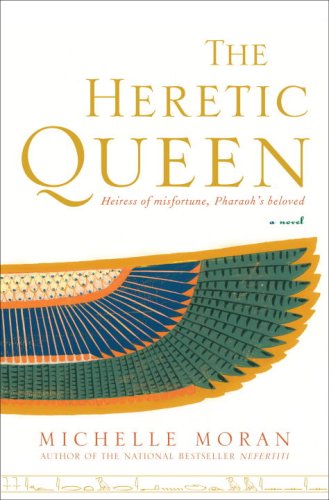Oooh!! And now the post I've been waiting for!!! Today, I bring you a great Questions and Answers Interview session with Michelle Moran. And for a treat, leave a comment and at least two comments on other posts that are relevant and you'll be entered to win one of two SIGNED copies of The Heretic Queen.

QUESTIONS
Upon writing your debut novel Nefertiti, did you know that you would be continuing with the story of Nefertari in The Heretic Queen?
When my publishing house purchased Nefertiti, they did so in a two-book deal. Not knowing how Nefertiti would be received, or whether I have ever get another chance at writing about ancient Egypt, I chose to tell the two most compelling stories I knew: that of Nefertiti and her sister Mutny, and that of Nefertari and her life with Ramesses the Great. It may sound strange that I chose to skip over a pharaoh as well known as Tutankhamun, but the truth is that he had a very short reign. After marrying his half-sister Ankhesenamun, he ruled until he was nineteen years old and then died of a broken leg (probably infection, and possibly a chariot accident). After Tut’s death, his grandfather Ay took the throne for a few short years, followed by the general Horemheb.
I certainly could have written an entire book on Horemheb’s reign, beginning with his marriage to Mutny, but I like my stories to have some glimmer of hope, some element of romance (there were plenty of romances in history!), and Mutny’s forced marriage and death in childbirth (unlike many Amarna mummies, hers has been recovered) didn’t seem very cheerful to me. So I chose to focus on what could have been her daughter, Nefertari. Of course, it’s unknown if Nefertari really was her daughter, and if not, exactly how they were related. But the historian Manetho provided me with the possibility, and so I took it and wrote what I think is a much more hopeful story.
I have read different places about the dialogue of choosing this title, could you tell us a little bit about that?
Certainly! I struggled a great deal in trying to find a title for this novel. As I mentioned on other blogs, a more appropriate title for the book would certainly have been The Warrior Queen, but that sounded too much like a fantasy novel, and with the ambiguous cover, I didn’t want to risk that. Even Nefertari would have been appropriate, but that sounded too much like Nefertiti. So ultimately, I chose The Heretic Queen because I wanted the book to focus on how the sins of the older generation can be visited upon the young, and the question of whether Nefertari would ever be able to overcome that.
I enjoyed the story of Nefertari so much, that I really hated for it to end. Are there bits and pieces that were cut in editing that you might ever share with your readers?
Oh, there’s always so much great stuff (well, great in my opinion!) that has to be left on the cutting room floor by the time the final edit is complete. Originally, there were many more scenes between Nefertari and Iset, both of whom were married to Ramesses and were part of his harem. I had also included much more on Ramesses and how he was responsible for commissioning many of the ancient buildings still standing in Egypt today. However, in my first novel, Akhenaten was a prolific builder, and my editor didn’t want readers to feel that this was more of the same (and rightly so).
There were also small, wonderful facts that really had no place in either of my novels and didn’t get included, but were wonderful anyway. For example, historically it is known that one of Nefertiti’s daughters had her own perfume line. While that’s quite glamorous, it really didn’t fit in with what I was writing, so I didn’t use it!

I've never read much about Egypt before reading your Nefertiti, how did a desire to write these Egyptian legends stories envelope you?
My travels to archaeological sites around the world have been enormously influential in my writing career. In fact, my inspiration to write on the Egyptian queen Nefertiti happened while I was on an archaeological dig in Israel. During my sophomore year in college, I found myself sitting in Anthropology 101, and when the professor mentioned that she was looking for volunteers who would like to join a dig in Israel, I was one of the first students to sign up. When I got to Israel, however, all of my archaeological dreams were dashed (probably because they centered around Indiana Jones). There were no fedora wearing men, no cities carved into rock, and certainly no Ark of the Covenant. I was very disappointed. Not only would a fedora have seemed out of place, but I couldn’t even use the tiny brushes I had packed. Apparently, archaeology is more about digging big ditches with pickaxes rather than dusting off artifacts. And it had never occurred to me until then that in order to get to those artifacts, one had to dig deep into the earth. Volunteering on an archaeological dig was hot, it was sweaty, it was incredibly dirty, and when I look back on the experience through the rose-tinged glasses of time, I think, Wow, was it fantastic! Especially when our team discovered an Egyptian scarab that proved the ancient Israelites had once traded with the Egyptians. Looking at that scarab in the dirt, I began to wonder who had owned it, and what had possessed them to undertake the long journey from their homeland to the fledgling country of Israel.
On my flight back to America I stopped in Berlin, and with a newfound appreciation for Egyptology, I visited the museum where Nefertiti’s limestone bust was being housed. The graceful curve of Nefertiti’s neck, her high cheekbones, and the faintest hint of a smile were captivating to me. Who was this woman with her self-possessed gaze and stunning features? I wanted to know more about Nefertiti’s story, and thus began my forays into writing historical fiction set in ancient Egypt.
What is your favorite scene from The Heretic Queen?
Oh gosh, I’m not sure! Certainly the scenes which were the most fun to write involved the two times Ramesses went into battle and brought his wives. I mean, can you imagine the rashness and self-confidence of a man willing to do that?
How would you relate your stories to some Creative Madness?
Well, I’m not sure any part of my process could be termed madness. I’m quite boringly methodical in my plotting, my creation of characters, and my writing. But I suppose you could consider some of my research “madness”. I try my best whenever possible to visit the places my characters actually lived and walked, no matter how much it’s changed in the millennia since. Sometimes, this involves going into currently unstable places, like Amarna in Egypt where we had to travel in an armored convoy to see the sites, and at other times in involves tough decisions, such as whether or not it’s wise to spend several thousand dollars for a twenty minute visit to a tomb. This last quandary occurred outside of Nefertari’s tomb.
At one time, visiting her tomb was practically free, but today, it can cost upwards of five thousand dollars. If you want to share the cost and go with a group, the cost lowers to the bargain-basement price of about three thousand. As a guide told us of the phenomenal price, I looked at my husband, and he looked at me. We had flown more than seven thousand miles, suffered the indignities of having to wear the same clothes for three days because of lost luggage… and really, what were the possibilities of our ever returning to Egypt again? There was only one choice. We paid the outrageous price, and I have never forgotten the experience.
While breathing in some of the most expensive air in the world (I figured it was about $20 a gulp), I saw a tomb that wasn’t just fit for a queen, but a goddess. In fact, Nefertari was only one of two (possibly three) queens ever deified in her lifetime, and as I gazed at the vibrant images on her tomb – jackals and bulls, cobras and gods - I knew that this wasn’t just any woman, but a woman who had been loved fiercely when she was alive. Because I am a sucker for romances, particularly if those romances actually happened, I immediately wanted to know more about Nefertari and Ramesses the Great. So my next stop was the Hall of Mummies at the Egyptian Museum in Cairo. There, resting beneath a heavy arc of glass, was the great Pharaoh himself. For a ninety-something year old man, he didn’t look too bad. His short red hair was combed back neatly and his face seemed strangely peaceful in its three thousand year repose. I tried to imagine him as he’d been when he was young – strong, athletic, frighteningly rash and incredibly romantic. Buildings and poetry remain today as testaments to Ramesses’s softer side, and in one of Ramesses’s more famous poems he calls Nefertari “the one for whom the sun shines.” His poetry to her can be found from Luxor to Abu Simbel, and it was my visit to Abu Simbel (where Ramesses built a temple for Nefertari) where I finally decided that I had to tell their story.
If you could write any and all books that you desired with no limits, who would your characters be and where would they be set?
No limits at all?! Well, then I’d probably set my book in medieval France. There would be fantastic romance, sweeping vistas and unassailable castles. If that sounds more like a fairy tale, that’s because I’ve always been fond of fairy tales and happy endings. Unfortunately, history doesn’t work that way. People die, plagues decimate entire villages, and women suffer loveless marriages and often terrible lives. In my own books, I try to find some middle ground; historical love stories that may or may not end happily, but always involve great love.

Tell us about your blog and author interviews...
I have a blog I call History Buff where I post excerpts to archaeological discoveries making the news today. Beneath those short excerpts I post links where readers can view the rest of the story. I’m a history nut. I love knowing what’s being unearthed and discovered around the world while I’m sitting at my desk typing away. Whether it’s in the field of anthropology or paleontology, I want to know about it!
As for my author interviews, that’s something I do to help promote other writers and the genre of historical fiction. There are so many wonderful authors out there, and so many types of historical fiction (romantic, suspense, literary…). I do one short interview a month (unfortunately, that’s all my schedule allows for), and I try to interview a wide range of authors, from NYT bestsellers to self-published writers. It doesn’t matter to me how an author’s been published; small press, large press, on the internet... If it’s good, and it’s something my History Buff readers might be interested in, I want to know about it!
What is something that you have never told anyone in the blogosphere?
Oh, geez. Probably that I’m a vegetarian and that I don’t drink. Okay, that’s not totally true. I do make an exception for the very rare glass of Piper Heidsieck (a lovely champagne that’s totally irresistible), but usually that only happens once a year.
What is the one thing that you want to leave readers of The Heretic Queen pondering over?
I would love for readers of The Heretic Queen to wonder more about the story of Moses and his place in Egyptian and Biblical history. I would also love for readers to come away thinking that they would like to read more historical novels on ancient Egypt. I make no pretense of writing what I call “beach read historical fiction,” but there are many other historical writers out there who delve even deeper into the subject of ancient Egypt. Readers who enjoy Egyptian fiction would probably really like Margaret George and Pauline Gedge.
For those of us, who cannot wait for more from our dear Michelle Moran, please please tell us about Cleopatra's Daughter...
Cleopatra's Daughter will follow the incredible life of Cleopatra's surviving children with Marc Antony -- twins, named Alexander Helios and Cleopatra Selene, and a younger son named Ptolemy. All three were taken to Rome and paraded through the streets, then sent off to be raised by Octavia (the wife whom Marc Antony left for Cleopatra). Raised in one of the most fascinating courts of all time, Cleopatra's children would have met Ovid, Seneca, Vitruvius (who inspired the Vitruvian man), Agrippa (who built the Pantheon), Herod, his sister Salome, the poets Virgil, Horace, Maecenas and so many others!
Click here to find out about all three of Michelle's books.
Click here, to go back and read my review of The Heretic Queen.
So remember for a treat, leave a comment and at least two comments on other posts that are relevant and you'll be entered to win one of two SIGNED copies of The Heretic Queen.
- MJ
Upon writing your debut novel Nefertiti, did you know that you would be continuing with the story of Nefertari in The Heretic Queen?
When my publishing house purchased Nefertiti, they did so in a two-book deal. Not knowing how Nefertiti would be received, or whether I have ever get another chance at writing about ancient Egypt, I chose to tell the two most compelling stories I knew: that of Nefertiti and her sister Mutny, and that of Nefertari and her life with Ramesses the Great. It may sound strange that I chose to skip over a pharaoh as well known as Tutankhamun, but the truth is that he had a very short reign. After marrying his half-sister Ankhesenamun, he ruled until he was nineteen years old and then died of a broken leg (probably infection, and possibly a chariot accident). After Tut’s death, his grandfather Ay took the throne for a few short years, followed by the general Horemheb.
I certainly could have written an entire book on Horemheb’s reign, beginning with his marriage to Mutny, but I like my stories to have some glimmer of hope, some element of romance (there were plenty of romances in history!), and Mutny’s forced marriage and death in childbirth (unlike many Amarna mummies, hers has been recovered) didn’t seem very cheerful to me. So I chose to focus on what could have been her daughter, Nefertari. Of course, it’s unknown if Nefertari really was her daughter, and if not, exactly how they were related. But the historian Manetho provided me with the possibility, and so I took it and wrote what I think is a much more hopeful story.
I have read different places about the dialogue of choosing this title, could you tell us a little bit about that?
Certainly! I struggled a great deal in trying to find a title for this novel. As I mentioned on other blogs, a more appropriate title for the book would certainly have been The Warrior Queen, but that sounded too much like a fantasy novel, and with the ambiguous cover, I didn’t want to risk that. Even Nefertari would have been appropriate, but that sounded too much like Nefertiti. So ultimately, I chose The Heretic Queen because I wanted the book to focus on how the sins of the older generation can be visited upon the young, and the question of whether Nefertari would ever be able to overcome that.
I enjoyed the story of Nefertari so much, that I really hated for it to end. Are there bits and pieces that were cut in editing that you might ever share with your readers?
Oh, there’s always so much great stuff (well, great in my opinion!) that has to be left on the cutting room floor by the time the final edit is complete. Originally, there were many more scenes between Nefertari and Iset, both of whom were married to Ramesses and were part of his harem. I had also included much more on Ramesses and how he was responsible for commissioning many of the ancient buildings still standing in Egypt today. However, in my first novel, Akhenaten was a prolific builder, and my editor didn’t want readers to feel that this was more of the same (and rightly so).
There were also small, wonderful facts that really had no place in either of my novels and didn’t get included, but were wonderful anyway. For example, historically it is known that one of Nefertiti’s daughters had her own perfume line. While that’s quite glamorous, it really didn’t fit in with what I was writing, so I didn’t use it!

I've never read much about Egypt before reading your Nefertiti, how did a desire to write these Egyptian legends stories envelope you?
My travels to archaeological sites around the world have been enormously influential in my writing career. In fact, my inspiration to write on the Egyptian queen Nefertiti happened while I was on an archaeological dig in Israel. During my sophomore year in college, I found myself sitting in Anthropology 101, and when the professor mentioned that she was looking for volunteers who would like to join a dig in Israel, I was one of the first students to sign up. When I got to Israel, however, all of my archaeological dreams were dashed (probably because they centered around Indiana Jones). There were no fedora wearing men, no cities carved into rock, and certainly no Ark of the Covenant. I was very disappointed. Not only would a fedora have seemed out of place, but I couldn’t even use the tiny brushes I had packed. Apparently, archaeology is more about digging big ditches with pickaxes rather than dusting off artifacts. And it had never occurred to me until then that in order to get to those artifacts, one had to dig deep into the earth. Volunteering on an archaeological dig was hot, it was sweaty, it was incredibly dirty, and when I look back on the experience through the rose-tinged glasses of time, I think, Wow, was it fantastic! Especially when our team discovered an Egyptian scarab that proved the ancient Israelites had once traded with the Egyptians. Looking at that scarab in the dirt, I began to wonder who had owned it, and what had possessed them to undertake the long journey from their homeland to the fledgling country of Israel.
On my flight back to America I stopped in Berlin, and with a newfound appreciation for Egyptology, I visited the museum where Nefertiti’s limestone bust was being housed. The graceful curve of Nefertiti’s neck, her high cheekbones, and the faintest hint of a smile were captivating to me. Who was this woman with her self-possessed gaze and stunning features? I wanted to know more about Nefertiti’s story, and thus began my forays into writing historical fiction set in ancient Egypt.
What is your favorite scene from The Heretic Queen?
Oh gosh, I’m not sure! Certainly the scenes which were the most fun to write involved the two times Ramesses went into battle and brought his wives. I mean, can you imagine the rashness and self-confidence of a man willing to do that?
How would you relate your stories to some Creative Madness?
Well, I’m not sure any part of my process could be termed madness. I’m quite boringly methodical in my plotting, my creation of characters, and my writing. But I suppose you could consider some of my research “madness”. I try my best whenever possible to visit the places my characters actually lived and walked, no matter how much it’s changed in the millennia since. Sometimes, this involves going into currently unstable places, like Amarna in Egypt where we had to travel in an armored convoy to see the sites, and at other times in involves tough decisions, such as whether or not it’s wise to spend several thousand dollars for a twenty minute visit to a tomb. This last quandary occurred outside of Nefertari’s tomb.
At one time, visiting her tomb was practically free, but today, it can cost upwards of five thousand dollars. If you want to share the cost and go with a group, the cost lowers to the bargain-basement price of about three thousand. As a guide told us of the phenomenal price, I looked at my husband, and he looked at me. We had flown more than seven thousand miles, suffered the indignities of having to wear the same clothes for three days because of lost luggage… and really, what were the possibilities of our ever returning to Egypt again? There was only one choice. We paid the outrageous price, and I have never forgotten the experience.
While breathing in some of the most expensive air in the world (I figured it was about $20 a gulp), I saw a tomb that wasn’t just fit for a queen, but a goddess. In fact, Nefertari was only one of two (possibly three) queens ever deified in her lifetime, and as I gazed at the vibrant images on her tomb – jackals and bulls, cobras and gods - I knew that this wasn’t just any woman, but a woman who had been loved fiercely when she was alive. Because I am a sucker for romances, particularly if those romances actually happened, I immediately wanted to know more about Nefertari and Ramesses the Great. So my next stop was the Hall of Mummies at the Egyptian Museum in Cairo. There, resting beneath a heavy arc of glass, was the great Pharaoh himself. For a ninety-something year old man, he didn’t look too bad. His short red hair was combed back neatly and his face seemed strangely peaceful in its three thousand year repose. I tried to imagine him as he’d been when he was young – strong, athletic, frighteningly rash and incredibly romantic. Buildings and poetry remain today as testaments to Ramesses’s softer side, and in one of Ramesses’s more famous poems he calls Nefertari “the one for whom the sun shines.” His poetry to her can be found from Luxor to Abu Simbel, and it was my visit to Abu Simbel (where Ramesses built a temple for Nefertari) where I finally decided that I had to tell their story.
If you could write any and all books that you desired with no limits, who would your characters be and where would they be set?
No limits at all?! Well, then I’d probably set my book in medieval France. There would be fantastic romance, sweeping vistas and unassailable castles. If that sounds more like a fairy tale, that’s because I’ve always been fond of fairy tales and happy endings. Unfortunately, history doesn’t work that way. People die, plagues decimate entire villages, and women suffer loveless marriages and often terrible lives. In my own books, I try to find some middle ground; historical love stories that may or may not end happily, but always involve great love.

Tell us about your blog and author interviews...
I have a blog I call History Buff where I post excerpts to archaeological discoveries making the news today. Beneath those short excerpts I post links where readers can view the rest of the story. I’m a history nut. I love knowing what’s being unearthed and discovered around the world while I’m sitting at my desk typing away. Whether it’s in the field of anthropology or paleontology, I want to know about it!
As for my author interviews, that’s something I do to help promote other writers and the genre of historical fiction. There are so many wonderful authors out there, and so many types of historical fiction (romantic, suspense, literary…). I do one short interview a month (unfortunately, that’s all my schedule allows for), and I try to interview a wide range of authors, from NYT bestsellers to self-published writers. It doesn’t matter to me how an author’s been published; small press, large press, on the internet... If it’s good, and it’s something my History Buff readers might be interested in, I want to know about it!
What is something that you have never told anyone in the blogosphere?
Oh, geez. Probably that I’m a vegetarian and that I don’t drink. Okay, that’s not totally true. I do make an exception for the very rare glass of Piper Heidsieck (a lovely champagne that’s totally irresistible), but usually that only happens once a year.
What is the one thing that you want to leave readers of The Heretic Queen pondering over?
I would love for readers of The Heretic Queen to wonder more about the story of Moses and his place in Egyptian and Biblical history. I would also love for readers to come away thinking that they would like to read more historical novels on ancient Egypt. I make no pretense of writing what I call “beach read historical fiction,” but there are many other historical writers out there who delve even deeper into the subject of ancient Egypt. Readers who enjoy Egyptian fiction would probably really like Margaret George and Pauline Gedge.
For those of us, who cannot wait for more from our dear Michelle Moran, please please tell us about Cleopatra's Daughter...
Cleopatra's Daughter will follow the incredible life of Cleopatra's surviving children with Marc Antony -- twins, named Alexander Helios and Cleopatra Selene, and a younger son named Ptolemy. All three were taken to Rome and paraded through the streets, then sent off to be raised by Octavia (the wife whom Marc Antony left for Cleopatra). Raised in one of the most fascinating courts of all time, Cleopatra's children would have met Ovid, Seneca, Vitruvius (who inspired the Vitruvian man), Agrippa (who built the Pantheon), Herod, his sister Salome, the poets Virgil, Horace, Maecenas and so many others!
Click here to find out about all three of Michelle's books.
Click here, to go back and read my review of The Heretic Queen.
So remember for a treat, leave a comment and at least two comments on other posts that are relevant and you'll be entered to win one of two SIGNED copies of The Heretic Queen.
- MJ

















14 comments and creative thoughts:
Thank you so much, CherryBlossom, for interviewing me and putting up all of these graphics!! I had never thought about which scene was my favorite before!
Thank you so much for stopping by! It means so much! :) I'm glad I could have you and I cannot wait until next year for Cleopatra's Daughter.
Terrific interview. I am dying to read this book!
Hey Julie, thanks for stopping by! Would you like to enter to win a signed copy???
Great interview! I've really been looking forward to reading this book, and it's fun getting a chance to hear what goes into making it. Cleopatra's Daughter sounds interesting too!
I think Michelle has lead a fascinating life! The research she has done for her books is amazing. I would love to win a copy of her book.
Please enter me in your delightful drawing. Many thanks, Cindi
jchoppes[at]hotmail[dot]com
Isn't it amazing what goes into the research for historical fictions and the special spark these authors have been given.
My children are just starting their history course, K4&1st, learning what archaeologists do before studying the ancients so this sounds like a great tie in for Mama.
For those who are interested in this time period & old Hollywood too, I highly recommend watching the bonus material on the Ten Commandments DVD. It goes through the thousands of little decisions Cecil B DeMille went through in creating his masterpiece set in Egypt. As anti-Hollywood as I am now (besides films such as Fireproof and the like) it was an amazing lesson in what parts of Hollywood used to be like--true loyalties and honesty. Wow. And there are great scenes filmed in Egypt, of course. I found the documentary on making the film almost as interesting as the film itself.
Bravo!!! I love the interview and it made me eager to read this book, and Cleopatra's daughter sounds amazing also. Please enter me in this drawing.
nsanchez69(at)yahoo(dot)com
I really, really have got to read these books!!! Great interview btw!
Great interview! I've been really wanting to read this so thanks for the contest!
thanks for the opportunity :)
mrsfarns07@hotmail. com
I absolutely must read these! I am a history buff and egypt is my all time favorite. Thanks for the chance!
And the Winners are: *drum roll please*
Ladytink_534 and Julie P.
Come on, seriously people. This was an easy entry contest and barely anyone followed the rules!!! Except of course my winners. (And the winners of the other two contests, congrats there as well). LBrons you do not count, btw, be checking your mail. *grin*
Congrats ladies! And look for more winnings to come!!!
Post a Comment